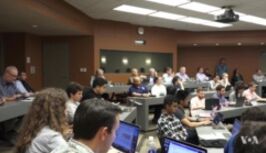正文
University Students Working to Solve US Defense Problems
Stanford University in California offers a class called “Hacking for Defense.”
This course helps Stanford students understand some of the national security issues facing the United States.
Students taking the course are not reading books or doing traditional research. Instead, they are working to solve problems given to them by the U.S. military.
Teachers launched the 10-week-long class last year. Now, it is being taught at eight other universities.

Class projects include helping troops deal with changes in mapping technology and creating sensors to help injured soldiers. Other projects involve cyber security -- helping protect computers from attack.
A teacher may ask students to find ways to help military veterans with more than one injury. Others can be asked to develop technology that will let Navy Seal divers stay underwater longer.
Benji Nguyen is a graduate student at Stanford. His interest is public policy.
“So I’m with USTRANSCOM, which manages transportation in the United States, to better-improve cyber security at the country’s seaports.”
Nguyen’s parents are from Vietnam.
“I’ve talked about this class, actually. Their impression is that when I’m here I’m studying, reading textbooks, or doing problem sets. When I told them I am actually working with the military to help solve a problem, they were really excited about it actually.”
Steve Blank is one of the teachers. He says students from other countries attend the class.
“We take the military intelligence problems and we scrub them down so anybody can work on them. But I was surprised by the number of foreign students from Singapore and China, from India, who were just interested in learning that same methodology and could take it home -- from wherever they are.”
Blank says the students learn how an organization makes decisions. They have to learn where the money for a project comes from, who controls the financing and who is going to build the project.
Some students create companies after completing their studies. Others accept positions at an agency they worked with.
Buvana Dayanandan wants to help injured soldiers.
“We are working on helping veterans that have experienced some polytrauma and figuring out how technology can increase their quality of life and their independence for a longer period of time.”
I’m Dan Friedell.
Michelle Quinn reported this story from Stanford University in California for hxen.net. Christopher Jones-Cruise adapted her report for Learning English. George Grow was the editor.
We want to hear from you. Write to us in the Comments Section, or visit our www.hxen.net .
相关文章
- Brazilian Painter Brings Attention to Threatened Amazon Rainforest
- US, Haiti Seek Release of 17 Missionaries Taken by Gang
- Former Diplomat Likely to Become Japan’s Next Prime Minister
- Creators of Molecule Building Tool Win Nobel Prize in Chemistry
- Robots Do It All at Japanese Car Factory
- S. Korea Launches Group to Debate ‘Living with COVID-19’
- 'A Piece of Red Calico,' by Frank Stockton
- Past Ability: Could, Was Able To, Managed To
- In Puerto Rico, Creative Directions Make Up for Missing Addresses
- 'Benito Cereno,' by Herman Melville, Part Three




 手机网站
手机网站